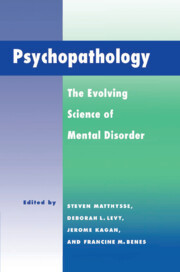Book contents
- Frontmatter
- Contents
- List of Contributors
- Preface
- Brain mechanisms
- Development
- 7 Editor's introduction: Methods in the developmental study of madness
- 8 Developmental psychopathology: From attribution toward information
- Comments on Sheldon H. White's chapter
- 9 A paradoxical partnership: Some historical and contemporary referents linking adult schizophreniform disorder and resilient children under stress
- 10 A look at the evolution of developmental models of schizophrenia
- 11 Developmental theory: Lessons from the study of risk and psychopathology
- 12 The return of the ancients: On temperament and development
- Thinking
- Genetics
- Response and reflections
- Author index
- Subject index
Comments on Sheldon H. White's chapter
Published online by Cambridge University Press: 04 May 2010
- Frontmatter
- Contents
- List of Contributors
- Preface
- Brain mechanisms
- Development
- 7 Editor's introduction: Methods in the developmental study of madness
- 8 Developmental psychopathology: From attribution toward information
- Comments on Sheldon H. White's chapter
- 9 A paradoxical partnership: Some historical and contemporary referents linking adult schizophreniform disorder and resilient children under stress
- 10 A look at the evolution of developmental models of schizophrenia
- 11 Developmental theory: Lessons from the study of risk and psychopathology
- 12 The return of the ancients: On temperament and development
- Thinking
- Genetics
- Response and reflections
- Author index
- Subject index
Summary
The progress from “attribution to information” can be traced in the area of adult psychopathology as well. Throughout the ages people with psychological illnesses came to the attention not only of physicians, but of witch-hunters, jailers, and protectors of society's morality. As noted in a remarkable appendix to The Vital Balance (Menninger et al., 1985), scattered through ancient Sumerian and Egyptian texts which date back to about 2500 B.C. are references to depressions and hysterical symptoms. And in the system of medicine in ancient India, the Ayur-Veda, about 1400 B.C., a kind of diagnostic dictionary was assembled on the basis of seven kinds of demonic possession. The symptoms of such conditions as psychosis, melancholia, obsessionality, or intoxication, for example, have been recognized from the beginnings of recorded history. It is not so much their recognition and description but their interpretation and significance that has shifted over time.
Naming, designating, and distinguishing these conditions is the activity of diagnosis. But the act of assigning names to conditions can itself introduce a valence that has made for much suffering over the ages. Just as with children, diagnosis as name-calling has been the occasion for burning at the stake, asphyxiation in the gas chamber, ostracism from society, or excuse from responsibility. It is not the scientific enterprise of designation and classification that produces these excesses, but the attributive activities of the interpreters.
- Type
- Chapter
- Information
- PsychopathologyThe Evolving Science of Mental Disorder, pp. 198 - 199Publisher: Cambridge University PressPrint publication year: 1996



